I attend Fordham University in New York City, but for this current semester, I'm participating in an exchange program with Universidad del Salvador, the city's Jesuit university. I'm being housed by a lady in her apartment in the neighborhood of Palermo, and so far the experience has been a marvel. Buenos Aires is a beautiful city, a marvelous place where every day it's possible to experience yet another reason why this is one of the great cities of the world.
I specifically came here because I'm a Spanish Language and Literature major, and through my Spanish literature classes at Fordham, I've developed a deep enthusiasm for the Argentine author Jorge Luis Borges, one of the literary giants of 20th-century literature. Buenos Aires rightly celebrates him as a prominent native son, and his homages to him can be found in various parts of the city. He actually lived quite close to the house where I'm staying in Palermo, and close nearby is the city's street bearing his name. Also close by is the Museo Evita, an elaborate homage to Eva Perón (1919-1952), wife of former president Juan Domingo Perón (1893-1974). To walk to it from my house, one has to cross Jorge Luis Borges Street. The irony here is immense.
Some Argentines would speak warmly of Perón and Evita, saying that their government was a great moment of national pride and potential, evaluating the working masses and helping to create a country keen on progress towards it. This affection is evidenced by the flowers left at Evita's tomb, the photos on postcards of her and of Perón, and the images of them on the street.
Other Argentines would call Perón an irresponsible tyrant and Evita a selfish ignoramus, a dastardly duo who set the country on a path to ruin from which it has yet to recover. Borges was firmly in this latter camp, and the coexistence of homage to him and homage to Perón and homage to Borges makes for an uneasy balance. Here we have living side by side, depending on whom you speak to, either culture and barbarism, or snobbery and the authentic Argentine ethos. One person's tyrant is another's hero. The city has a split personality, and this problem will not likely be resolved any time soon. Yet, accepting the risk of being taken to herein be displaying favor for the cultural sophistication (or backward snobbishness) represented by Borges's side of the city's personality, I would like to propose a bit of a way out suggested by one of Borges's greatest stories.
In "El sur' ["The South"], the protagonist, a man named Juan Dahlmann, is of dual ancestry. On one side he is descended from a German immigrant and evangelical pastor. On the other side, he is the descendant of an Argentine war hero. He works as a librarian but longs to relocate to the family estate to the south of Buenos Aires. In other words, his life outwardly conforms to the domesticated life of one half of him, but his interior self longs for his life to be conformed instead to the epitome of wild, authentic Argentineness. Dahlmann's chance to integrate these two halves of himself comes when he goes by train to the estate after a stay in the hospital for septicemia, but instead of arriving at the estate, a twist of fate has him die in a knife fight en route. Dahlmann, trapped in one way of life, finally gains his wish of conforming himself to its opposite number.
Two things: it is possible to interpret the story in such a way that Dahlmann's southward journey and valiant death are simply part of a dream; and, even in his valiant death, he never escapes from his bookish life. He has no idea how to handle a knife. In this story then, culture and barbarism (or pusillanimity and valor), diametrically opposed to each other, are reconciled, in however much of a contradictory way, in a fantastic narrative. Argentine literature is rightly recognized as delighting in the permeable boundary between fiction and reality. Argentines, so conscious of their split personality, quite understandably funnel their frustrations with their national situation through this "Twilight Zone" world of the fertile crack between reality and dreaming.
The city of Buenos Aires, so self-consciously polarized, might do well to joyfully recognize the creative potential of its contradictions, and it just might accomplish something beautiful in going beyond reason, in a quagmire already characterized by much unreason, towards a celebration of the nation's potential (and a communal effort towards actualizing that potential) that is, finally, neither tyranny nor anarchy, but neither and anything but: in a word, true liberty. This is not to deny that there are serious political realities that need to be worked out (one thinks, above all, of Peronist emphasis on national sovereignty, and what that means--nationalism vs neocolonial bondage--for Argentina). But it seems undeniable that Argentina, of all the countries in the world, has a gift for recognizing art as a place to push the limits of what is possible. And, if political peace in Argentina seems to be as much of an impossibility as anything could possibly be, then let the opening of minds begin.






















